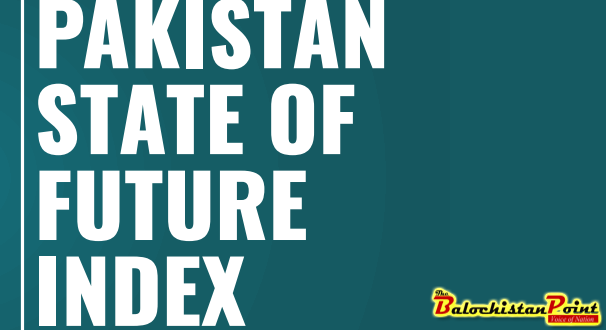KARACHI: The second edition of Pakistan State of Future Index “The Future of Possibilities” launched – the current edition explored potential developments that would impact the country’s outlook in the coming years. The index included two new variables; internal and external debt. The 32 variables in the 2029 edition covers: population, CO2 emissions (kt), alternative and nuclear energy (% of total energy use), food production index, forest area (% of land area), freedom level, GDP per capita (constant 2010 US$), GDP per unit of energy use (constant 2011 PPP $ per kg of oil eq), intentional homicides (per 100,000 people), mortality rate (infant; per 1000 live births), individuals using the internet (% of population), CPIA (transparency, accountability, and corruption 1=low to 6=high), life expectancy at birth (total; years), youth literacy rate (population; 15-24 years, both sexes %), refugee population by country or territory of origin, people killed or injured in terrorist attacks, physicians (per 1000 people), population growth (annual %), improved water source (% of population with access), poverty headcount ratio at $1.90 a day (2011 PPP; % of population), malaria (confirmed with microscopy), research and development expenditure (% of GDP), tertiary education (universities), proportion of seats held by women in national parliaments (%), total debt service (% of GNI), unemployment, (total % of total labor force – national estimate), imports (millions US $), exports (millions US $), federal taxes (total; millions PKR), inflation (consumer prices; annual %), internal debt (million US $), external debt (million US $).
In 2017, AGAHI launched the first edition of Pakistan State of Future Index; this effort was to establish futures thinking in matters of public policy, the updated version covers the impact of local, regional and global developments across 32 variables – this aspect of the study helps us give a sensible mechanism to the overall policy discourse in the country. As we stressed tested these developments, our findings lead us to believe that despite much of the upheaval the country still continues to emerge as improving; said Puruesh Chaudhary Founder and President AGAHI and Founder Foresight Lab. The Trend Impact Analysis incorporates 50 potential developments. AGAHI in collaboration with Strategic Vision Institute held a brain storming session in July 2019 to identify plausible future development that would have an impact on the wellbeing of the people of Pakistan. The participations from the session highlighted more than 150 developments that could have an impact on the country’s future condition; this session was followed-up in interactions with multiple stakeholders, which included the academia, civil bureaucracy, national security analysts, intelligence community, economists, scientists, scholars, entrepreneurs, political leadership, students. Mazia Mashkoor a Data Analyst explained that by “Including the impact of some of the potential developments in the extrapolated values of the variables selected can produce a range of outcomes (i.e. lower, median and upper quartiles: LQ, MQ and UQ); this is essentially the strength of the TIA method”.
Pakistan State of Future Index was incorporated in to Chapter 2 of the Millennium Project’s major publication State of Future 19.0; which brings together an extraordinary set of data, information, intelligence and collective wisdom to the decision-makers, opinion leaders, researchers, and analysts. The State of the Future improves readers’ global foresight. More than 60 Millennium Project Nodes participate in improving collective intelligence system on the future of the world. Jerome C. Glenn, CEO, The Millennium Project said, “The Pakistan State of the Future Index and its Trend Impact Analysis is a systematic way to think ahead to build a better future for all”. The State of Future Index and Trend Impact Analysis was developed by AGAHI’s partner institute the Millennium Project as an effort to measure the changing state of the future. The index shows whether the conditions, globally and nationally, promise to get better or worse.
Earlier this year AGAHI trained more than 200 academics on Realtime Delphi (RTD). The RTD approach in an online group facilitation technique, which is an iterative multistage process, designed to transform opinion into group consensus. AGAHI with a team of local experts developed the platform for the knowledge community in Pakistan.
Web Desk
Published in The Balochistan Point on January 1, 2020
 Balochistan Point Voice of Nation
Balochistan Point Voice of Nation




